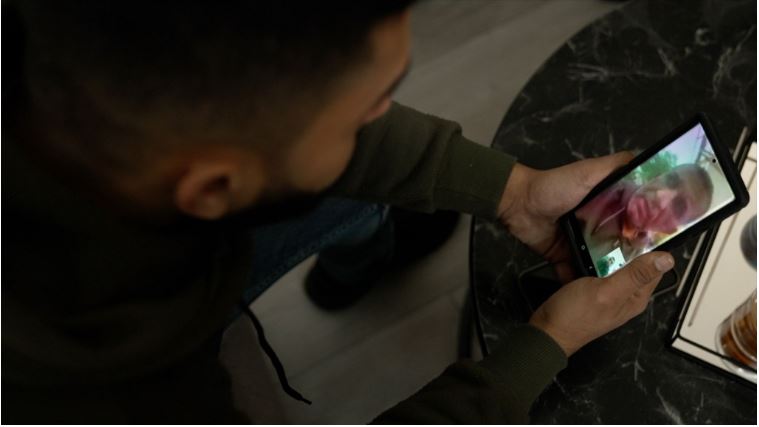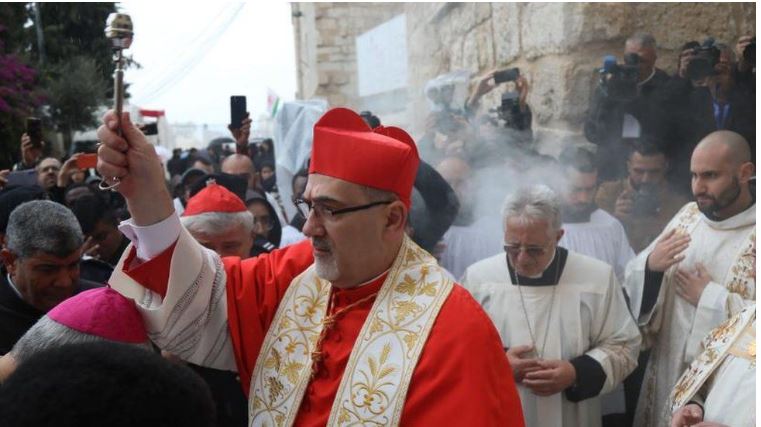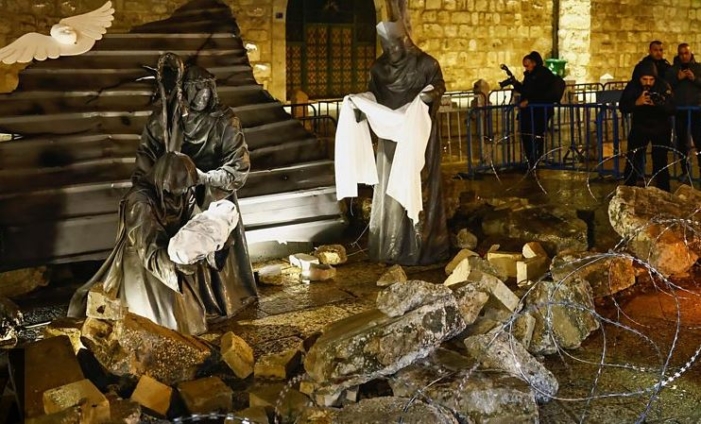The atmosphere in Bethlehem is heavy with absence.
Christmas celebrations have been cancelled this year and the thousands of tourists and pilgrims who would normally fill Manger Square are nowhere to be found.
"The city is empty from happiness, from joy, from kids, from Santa. There is no celebration this year," says Madeleine, a resident of Bethlehem, in the occupied West Bank.
The famous Christmas tree, usually in the middle of the square, is not there. There are no carols or Christmas market stands.
Instead, a nativity scene, which shows a newborn Jesus surrounded by big rocks and barbed wire, has been installed as a tribute to the children of Gaza.
In an unusually empty Nativity Church, Father Eissa Thaldjiya says his city feels like a shadow of itself.
"I've been a priest in this church for 12 years. I was born in Bethlehem, and I've never seen it like this - even during the Covid-19 pandemic," he says.
"We have brothers and sisters in Gaza - this is what makes it difficult to celebrate… But it's good to be united in prayers."
Jawdat Mikhael lives in Bethlehem, but his family is trapped in Northern Gaza. His parents, brother and dozens of other relatives have been sheltering in the Holy Family Church near Shejaiya in the east of Gaza City - an area devastated by Israeli bombardment.
As Jawdat and I are talking, a call from his father Han'na Mikhael comes through.

The line is crackly and the connection is unstable - yet he hangs on for a glimpse of his dad.
Han'na tells his son the family is doing ok. He says he's managed to venture out of the church for the first time in more than two weeks to try to find some food. He says that all that is left around the church is rubble and that all the shops are burned. "It's a total destruction," he says.
He wells up as he says that communications are down and that there is no water. Food is scarce, too - "enough to keep you alive - not to fill your stomach," he says.
Han'na cries as he narrates how different Christmas was last year.
"On days like this, we'd be decorating the church. There'd be carols. People would come over to help. But now we're just praying to make it out of here alive."
The family has already suffered a terrible loss.
A week ago, Jawdat's grandmother, Naheda Khalil Anton - who was also sheltering in the church in Gaza - was shot twice in the stomach as she was on her way to the bathroom. His aunt Samar Kamal Anton rushed to help her and was shot in the head.
Jawdat shows me pictures of the immediate aftermath and the funeral.

His family had been sheltering in the Holy Family Church since the beginning of the war. Now, they've buried their loved ones there.
The family blames Israeli snipers for their death. The IDF says it will continue its investigation.
Through tears, Han'na says that his two family members died before his eyes: "It was a shock... It was unbearable."
He apologises to me for crying, and for not being able to speak much: "I'm sorry, but it's just so difficult. We've endured so much."
A big bang is heard as we are talking, then a second sounds out before Jawdat reluctantly says goodbye to his dad.
This morning in Bethlehem, church bells have been ringing as some locals gathered around the Jesus in the rubble installation and Arabic songs played out on the speakers, one calling for salam - peace - for children.
Dozens of people are in the middle holding a big Palestinian flag - waving it up and down.
The Latin Patriarch of Jerusalem, Pierbattista Pizzaballa, is in Bethlehem for his traditional address. He was wearing the traditional black and white chequered Palestinian scarf.
Before he entered the Church of Nativity, he said this was "a very sad Christmas".

"We are in a war, a terrible war. Our thoughts go first and foremost to Gaza, to our people in Gaza... Two million are suffering," he said.
He added that "a ceasefire is not enough".
"We have to stop these hostilities and turn the page because violence generates only violence."
A few steps away from Manger Square, souvenir shops line Star Street on both sides but without the usual bustle of buying, selling and haggling. The famous Palestinian stitch scarves, cushion covers and artifacts hang outside shops, untouched.
This is normally a high season for the market. Not this year.
"We cannot celebrate with a lot of people killed in Gaza," says Abood Subouh, a shop owner in the local market just off Manger Square.
He said that, sad as it is to see his city and his business this way, celebrating Christmas feels wrong this year: "We can't be happy because we are not on the other side of the world. We are still in Palestine."
Latest Stories
-
We knew we could beat Ghana- Niger coach Badou Zaki
6 mins -
Former NSMQ ‘shark’ returns to school, says the future is bright
7 mins -
AFCON 2025Q: Ghana lose 2-1 to Niger at home to end disastrous campaign
22 mins -
AFCON 2025Q: Ghana lose to Niger at home to end disastrous campaign
23 mins -
Catholic Bishops Conference calls for strengthening of state institutions ahead of elections
1 hour -
Nana Asihene laments how some musicians stalled his documentary on Ghanaian music
1 hour -
Ntim Fordjour awards Assin South’s best teacher a car, along with prizes for others
2 hours -
Over 80% of non-functional fire tenders restored – GNFS
2 hours -
Louisa Atta-Agyemang elected Chairperson of Democrat Union of Africa
2 hours -
Propaganda and rumours have no place in education – Chief of Staff on ‘expired’ rice scandal
2 hours -
Couples display Ghanaian culture at 2024 Joy Prime Made in Ghana Fair
2 hours -
We won’t imprison people for possession of cannabis – CPP running mate
2 hours -
JoyLearning wins Joy Prime Made in Ghana Fair cooking contest
3 hours -
Alan slams Kufuor’s endorsement of Bawumia, says he’s venturing into dangerous territory
3 hours -
How corporate divestment silenced music reality shows
3 hours

